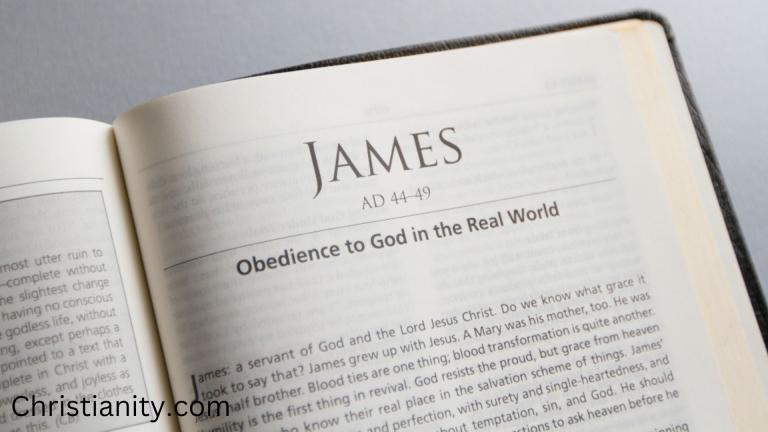Monday: Read James 1:1-4; John 7:1-5; Acts 15:13-29
The book of James was written by James (1), but which one? The most likely answer is James the brother of Jesus. The writer of this letter certainly has authority over and the respect of the community to whom the letter was written. And it is evident from the account of the Jerusalem council in Acts 15 that James the brother of Jesus was the leader of the Jerusalem church (Acts 15:13-29). As the leader of the Jerusalem church, James had tremendous authority and was one of the key leaders in the early Christian movement.
The significance of James the brother of Jesus as the author is that neither he nor any of the other brothers of Jesus were followers (or believers) in Jesus before the crucifixion (John 7:1-5—Hence the reason why Jesus entrusts his mother’s care to John; John 19:25-27). The best explanation for James’ conversion to Jesus is, as Paul notes, that Jesus appeared to him after the resurrection (1 Cor 15:7). That James self-identifies as a “bond-servant of God and of the Lord Jesus Christ” (1) is incredible. A “servant” of his own brother, whom he mocked (John 7:1-5)!
James is recognized as an apostle by Paul (Gal 1:19) and one of the “pillars” of the church (Gal 2:9). Tradition has it that James was killed in Jerusalem in the year AD 62.
James encourages his readers to endure their trials by considering the end result: endurance! (2-3). It is likely that the community to whom James wrote was socio-economically oppressed.
James not only wants them to endure but to consider it joy (2). His use of “joy” here reminds us of the author of Hebrews’ affirmation of Jesus, “who for the joy set before Him endured the cross” (Heb 12:2).
Questions to ponder/discuss:
- The exhortation to consider their trials all joy is widely popular in Christian circles. We should note, however, that “joy” here and elsewhere in the NT is often associated with suffering (see Rom 5:2-5; 1 Pet 1:6-7). It does not mean that one must particularly like the suffering—Jesus may have considered the cross as pure joy (Heb 12:2) but He still cried out wondering why God had seemingly forsaken Him (Matt 27:46). What James points to is the reward that comes from suffering. Herein lies the value of wisdom that comes from God (5)
- More than anything, as we will see as we progress through our study of James is that James is more concerned with how they respond to their suffering. How well do you respond to difficulties and suffering? What can you do so that you might do better?
Tuesday: Read James 1:5-18
How is it that they are enabled to endure trials? By gaining wisdom (5). And if anyone lacks wisdom, they should ask God (5). This, of course, is the very thing Adam and Eve should have done. They needed wisdom but they failed to acknowledge that God is the source of wisdom.
In the culture in which James was written, the natural response to oppression was to fight back: both in speech and with acts of violence (see 1:19-21; 3:13-4:12). James, instead, wants them to resist the use of violence and wait for God to bring justice (9-11). For it is the person who perseveres under trial that is blessed (12).
James again uses imagery from the creation narrative. He notes that the temptation to retaliate does not come from God (13). Instead, it is our sinful desires (14), which give birth to sin, which, as Adam and Eve learned, begets death (15).
Not only is God not the source of our temptation, but He brought us into being as followers of Christ in order that we might be “a kind of first fruits among His creatures” (18); that is, we were brought about by God to be the beginning of His new creation.
Questions to ponder/discuss:
- Part of the understanding of enduring trials and not retaliating is tied to an understanding of God’s purpose in creation. It was His will that we gain wisdom from Him. Adam and Eve failed. However, when we seek God for wisdom, we are fulfilling God’s desire to restore His creation. What are some practical steps to gaining such wisdom?
Wednesday: Read James 1:19-27; Matt 7:12-27
James issues three commands: everyone must be: “quick to hear,” “slow to speak,” and “slow to anger” (19). James continues to show concern for how his readers respond to oppression. He explains that anger does not bring out “the righteousness of God” (20). As a result, (therefore) James exhorts us, “putting aside all filthiness and all that remains of wickedness, in humility receive the word implanted” (21).
It is critical to recognize that James is not speaking of one’s personal righteousness and salvation. He is speaking about what it means to be the “first fruit” of God’s new creation (18).
James continues with his theme of creation and new creation by exhorting his readers to be doers of the word (22) and not be like those who deceive themselves (22, 26—think Adam and Eve). The result is being “blessed in what one does” (25).
What does it mean to be a doer of the Word? For James, it begins with controlling the tongue (26). Then it incorporates caring for the most marginalized persons in society (widows and orphans). Finally, it means “to keep oneself unstained by the world” (27).
Questions to ponder/discuss:
- As the saying goes, “we have two ears and one mouth, let’s use them in the same proportion.”
- The goal of achieving “the righteousness of God” (20) is best understood in terms of God’s desire to bring about a people through whom a just society emerges. That is when we respond in anger we are living according to the ways of this world. When we allow God to give us wisdom, we are equipped to live according to the new creation. How does understanding this help you during times when you want to lash out in anger?
- If you have had an experience in which you didn’t act in anger, and things turned out in ways you could not have imagined, share that with others.
Thursday: Read 2:1-13
One of James’ concerns was over how the community to whom he was writing was treating the poor unjustly and showing favoritism towards the wealthy. Such behavior was expected since the wealthy could reciprocate and help ensure them with economic favor and the poor could not: hence, their “evil motives” (4).
The tragedy is compounded when we realize that the poor person is their brother/sister in Christ (see 2:5; 1:9) and the wealthy person is their oppressor and the one responsible for dragging them into courts (the wealthy person was always going to get a favorable ruling in the courts). The irony is that God chose the poor and they were choosing the wealthy oppressor (5-6), who were blaspheming the Name of God (7).
By loving the poor members of the community, they were fulfilling the “royal law”: which is “you shall love your neighbor as yourself” (8; Lev 19:15, 18). To not love one another is to be guilty of breaking all of the laws (10).
James picks out two laws, adultery and murder (11). Why did James select these two laws? It could be that these two laws were both used by Jesus in Matt 5:21-32. Note in Matt 5:21-26, Jesus equates hatred of one another as murder. Thus, although they may not have been guilty of adultery, they were guilty of murder (either by actually murdering someone or more likely by hating their brothers/sisters).
James concludes by noting that if they are merciless, God will be merciless (13).
Questions to ponder/discuss:
- It is fundamental to the teachings of Jesus (which James seems quite familiar with) that we are called to follow Jesus in the way of love toward all even when there is no personal gain. What are the reasons why we struggle to love those who are deemed lesser by society? What are some steps you might take to improve in this area?
Friday: Read 2:14-26
Today’s reading is certainly one of great debate within Protestant churches. The Protestant stress on salvation by grace through faith (Eph 2:8-9) is certainly justified in Scripture. As Titus says, “He saved us, not on the basis of deeds which we have done in righteousness, but according to His mercy” (Tit 3:5).
Yet, does salvation by grace through faith eliminate the role of works entirely? Although virtually all Christians recognize that the answer to the previous question is “no,” it seems as though works do have a role in the process of salvation. As James says, “faith, if it has no works, is dead” (14).
James spells out the relationship between faith and works. Works demonstrate faith (18). Faith works with works (22) and is perfected by works (22). Finally, works bring faith to its fulfillment (2:23).
For James, faith without works is no good at all (14). Thus, seeing a brother/sister in need and not providing them with food or clothes means that their faith is useless (16, 20). James adds that believing in God is not sufficient. After all, even the demons believe in God (19).
James then appeals to the examples of Abraham (21-23) and Rahab (25). Abraham was “justified by works” (21). Thus, he contends that a person “is justified by works and not by faith alone” (24).
James concludes with, “For, as the body without the spirit is dead; so faith without works is dead (26).
Questions to ponder/discuss:
- There are a lot of ways that this passage has been dealt with. Some attempt to minimize the passage (or eliminate it as Martin Luther did) by suggesting that genuine faith produces works. Others contend that faith and works are separate and that both are necessary.
- One of the advantages of laying stress upon grace and faith as the necessary elements of salvation is that it places a healthy focus on God’s sovereignty.
- One of the advantages of placing stress on the necessity of doing good works is that it places a healthy focus on the importance of continued obedience.
- It seems that for James faith and works are inseparable. How do you understand the role of faith and works?
- What are some potential problems that arise from arguing that works are not a part of one’s salvation?
[1] This guide is meant to be done either as a group study over the course of 2 or 4 meetings (Day 1-5; 6-10; 11-15; 16-20), or as a private devotion over the course of 4 weeks (or a calendar month—5 lessons per week).


















